Pirates manager Clint Hurdle making a difference daily with words of inspiration
September 30, 2013
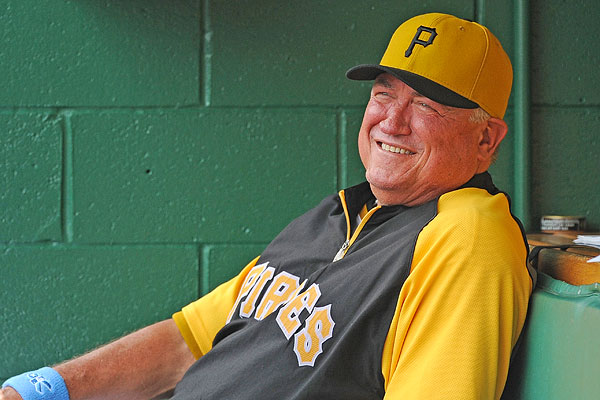
So there sat the Pirates' skipper, once the opposite of serene, entering a "Thought Of The Day" into his smartphone. A mile from The Ballpark in Arlington, he hit send, and 1,000 people from all over the world -- including his players, his players' wives, his players' friends, his coaching friends, his lifelong buddies, his monthlong buddies -- received the following email:
That same night, the Pirates loved Clint Hurdle back. They defeated Darvish, 1-0, for their 82nd win, then hugged their manager for always hugging them. No one is sure whether his email had freed their minds or whether the players even read it. "I think it's 50-50," a team employee said.
But, either way, just knowing that he was always up at night thinking of them, that he was always on his phone typing to them, had helped the 2013 Pirates change one of the losingest cultures in sports.
Three weeks later, the team clinched a National League wild-card berth -- the first playoff spot that might have been won partly thanks to emails.
As a player, Clint Hurdle was the wrong kind of happy. A daily six-pack of Budweiser will do that to you. He once shared an apartment with his Kansas City Royalsteammate George Brett, until Brett kicked him out for raising too much hell.
[+] Enlarge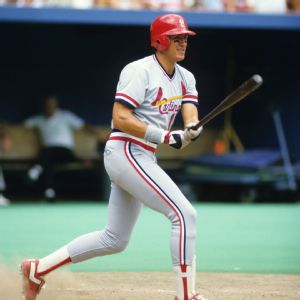

George Gojkovich/Getty ImagesAs a player, Clint Hurdle never lived up to the "phenom" label, hitting .259 in 10 seasons as a major-league journeyman.
He would end up having only a one season of note -- batting .294 for the 1980 American League champion Royals, then going 5-for-12 in the World Series -- but, other than that, he became known mostly for being in the wrong place at the wrong time. He played for the Mets in 1985, one year before they won the World Series, and was then picked up by the Cardinals in 1986, one year after St. Louis reached the World Series. He was then traded back to the Mets in 1987, the same year the Cardinals returned to the World Series.
He was always a year late or a dollar short -- which is why he spent the 1981 players' strike bartending -- and his career batting average through 10 seasons was a middling .259 to go with 32 home runs and two divorces. He was a Tom Berenger lookalike who had acted a fool. But, although few could have known it at the time, Clint Hurdle, deep down, was not who they thought he was.
He turned his life around, bit by bit, but the first step was going to manage in the minor leagues. Say all you want about Hurdle's failings, the man could command a room. A bullhorn of a voice, used correctly, can be a powerful thing. He was loud, proud and available to his players every night after 10 at the bar.
He didn't just talk about hanging sliders, either. Hurdle was well-read, a former honor student from Florida's Atlantic coast who received all A's in high school except for one B -- in driver's ed. He was accepted at Harvard but instead chose baseball, where he would come to find that a little wisdom can go a long way.
He would quote everything from Shakespeare to the Beatles, depending on the day, and the minor leaguers began to flock to him.
[+] Enlarge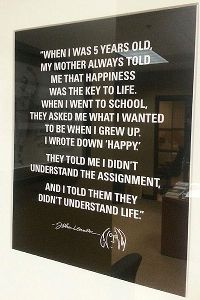

Courtesy of the Pittsburgh PiratesThe John Lennon quote about happiness is framed on the wall in Clint Hurdle's office at PNC Park.
His players ran through walls -- not stop signs at third base -- for him. He would act macho with the snide players and thoughtful with the sensitive ones. He coached the mind as much as he coached baseball, which essentially meant he was big league manager material. If he could stay sober, that is.
He went to Alcoholics Anonymous meetings, and, instead of pretending to be a Christian, he actually read the Bible by his bed. He rose up through the New York Mets organization using the same aphorisms over and over: "All you can control is your attitude and your effort… Multitasking makes us multimediocre… It takes courage to have patience… They never care how much you know until they know how much you care."
While he was managing the Mets' Double-A Williamsport Bills in 1991, he even found a woman who could keep him in line. Karla Yearick was an accountant from nearby Muncy, Pa., who loved Hurdle for who he was but wouldn't tolerate his occasional beer binges. He claimed he was dedicated to his sobriety; she claimed he wasn't. Six years into their relationship, he asked her to marry him, and her answer was a bald-faced no -- unless he could make himself happy without a six-pack. He felt like a bust all over again.
The Colorado Rockies knew a communicator when they saw one, and, in 1997, just as Karla had broken his heart, they named Hurdle their big league batting coach.
In a place that's a mile high, with scores that are regularly 12-11, batting coach of the Rockies is a pretty good gig. It is a lot better than being the Rockies' pitching coach. So, Hurdle settled in well, then found the off-the-field mentor he'd been searching for: Keli McGregor.
McGregor was a former NFL tight end for the Broncos and Colts who had ascended to the position of Rockies executive vice president. And, in some ways, Hurdle had finally met his match. Six-foot-8 McGregor was five inches taller and, at times, quite a few decibels louder. They connected instantly. Eventually, Hurdle would bare his soul to McGregor, telling him about Karla and his own demanding father, Clinton, who rarely told his son, "I love you."
[+] Enlarge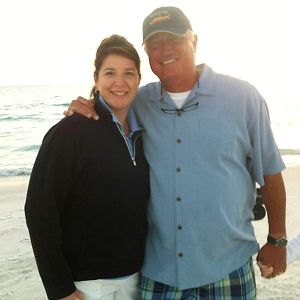

Courtesy of the Hurdle familyClint Hurdle married his wife, Karla, in 2000, after his second marriage proposal.
"He'd say, 'Always make a difference. Don't stop doing that.'"
As a result, McGregor had made a difference in Hurdle. Karla noticed it, and, when Hurdle again asked her to marry him, in 2000, her answer was yes. He had quit drinking for good in 1998, and Karla knew it wasn't an act this time. By 2001, McGregor had been named president of the team, and, when the managerial job came open in 2002, McGregor and general manager Dan O'Dowd handed Hurdle the job.
"I wish I had a dollar for every time someone said we'd never win," Hurdle says.
Just when everyone assumed they'd be the same ol' Rockies under Hurdle, he took them for the ride of their lives. It was 2007, and, with 14 games to play, Colorado was in fourth place in the National League West. But Hurdle never stopped with his aphorisms -- "All we have to do is score one more run than the other team," for example -- and the power of positive thinking somehow prevailed.
The Rockies won 13 of their last 14 (21 of 22 in all) to force a one-game playoff at home against the Padres. They rallied from two runs down in the bottom of the 13th to win and eventually advanced all the way to the NLCS. But, on the night the Rockies clinched a World Series berth, Hurdle was the first to leave the celebration. He had to go to the hospital to see Maddie.
[+] Enlarge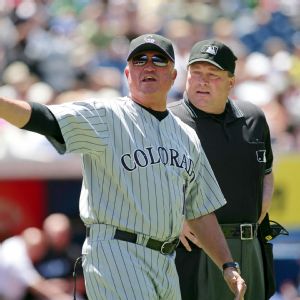

Tom Szczerbowski/USA TODAY SportsOn the strength of an incredible September run in 2007, Clint Hurdle led the Rockies to their only World Series appearance.
"On the day I heard the news, I got to my hotel room in Houston, and I started bawling," says Hurdle, who was in his first season as Rockies manager at the time. "I mean, I cried more in three days than I had in probably 25 years."
A comment his sister and his wife have made in the years since then is that Maddie took Hurdle to a place he'd never been before. McGregor had started him along the way, but life with Maddie was what eventually gave Hurdle what he calls "his epiphany." As she grew older, she suffered from seizures, and, on the night the Rockies won the pennant, Maddie was in that hospital with pneumonia, alone with Karla, asking for her daddy.
Clint rushed to her, of course, just as he would get up with her every morning when he wasn't on the road to make her breakfast, to make sure she stuck to her 900 allowed calories a day. They had "Maddie and Daddy" Saturdays -- special outings for just the two of them -- and she sat through as many Rockies games, Sunday through Friday, as she could.
"I was asked to rebuild a house in Colorado," Hurdle says, referring to the Rockies. "We got to the World Series. But one of the things that had to be rebuilt, along the way, was me."
The Red Sox swept the Rockies in the 2007 Fall Classic, and, from there, the free fall was swift. Colorado finished 74-88 in 2008, and, after an 18-28 start to the 2009 season, McGregor did what no friend could ever imagine doing: He fired his buddy.
It wasn't McGregor's decision alone to send Hurdle packing; an owner and a GM chimed in, as well. But, as team president, he had to do the dirty work, and it was dirty.
"Fourteen months after our greatest victory, I was fired by the two people [McGregor and O'Dowd] I admired most," Hurdle says. "Keli and I, we connected in our own way. Our families interacted. He had an affection for Maddie, the way he could get her to light up. We would take walks during the season, after the season. We got to be really close friends.
"But I think my staff and my players saw that I was going to handle my exit better than my entrance. For eight years, I had preached continuity, faith in your teammates, selflessness, belief when others don't believe. Things I had talked about and emailed from my manager's chair. So when the day came I was fired, I wasn't going to yell and scream that I got a raw deal. It's good to not only talk the talk but walk the walk."
About a week later, Hurdle received several phone calls from the Rockies coaches he had left behind, who badly missed his upbeat sayings. "I'm like, 'Are you kidding? I got fired here, and you need inspiration?" Hurdle says, laughing. "But I was giving something they found useful and they wanted more of."
So that's how it was born. Hurdle began sending daily emails to 12 members of the Rockies' staff and organization -- after he was fired. A dozen emails that brightened their day, and ultimately their season. The 2009 Rockies went on to win the NL wild card, losing to the Phillies in four games but proving that Clint Hurdle could build a house that lasts.
By the end of that season, 500 people were getting his emails.
Hurdle was in demand, of course, and he was hired as the Texas Rangers' hitting coach for the 2010 season. As usual, he immediately commanded the room, or at least the batting cage. Josh Hamilton looked into Hurdle's eyes and saw himself -- a can't-miss phenom derailed by alcohol. Hurdle begged Hamilton to have a career the opposite of his, and the kid ended up batting .359 with 32 home runs -- the exact total Hurdle had for his entire career.
The best part of the season was that the Rangers reached their first World Series -- funny how Hurdle was now in the right place at the right time. The worst part was the news that Keli McGregor was dead.
On April 20, 2010, Hurdle had been in the Fenway Park clubhouse when he learned that McGregor had died suddenly, at 48, in a Salt Lake City hotel room. They had been together not long before, and McGregor had been his robust self. After the firing, they had made it a point to meet once a month, to take their walks. There were never hard feelings. Now, this news was unbearable.
"I walked outside, under the Green Monster, and I think I cried for 30 minutes, because I needed to," Hurdle said as a speaker at McGregor's memorial service.
[+] Enlarge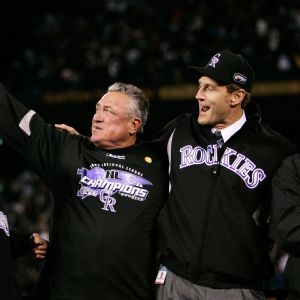

Jerry Lai/USA TODAY SportsClint Hurdle found a mentor in Keli McGregor, the Rockies' executive vice president, who suffered an untimely death in 2010.
After the 2010 season, two teams offered Hurdle their manager's job -- the big-market Mets and the little engine that couldn't, the Pirates. He had history with the Mets' organization; it had given him his first coaching job. Plus, the Mets had money to spend, a new ballpark and millions of eyes watching their every move on TV.
But Hurdle chose the Pirates. He did it partly because he was impressed by general manager Neal Huntington's vision to build through the farm system and by owner Robert Nutting's commitment to sign the presumed-unsignable No. 1 draft picks. But that wasn't the bulk of it. The city of Pittsburgh was also home to The Children's Institute, one of the premier Prader-Willi treatment facilities in the country. Hurdle had become a national spokesman for the disorder and was already well aware of the doctors there. Maddie would have a place to be treated, if necessary, a place to flourish. And Maddie always came first.
In other words, she was about to take him to another place he'd never been before -- last place in the NL Central.
"It was one of the great coaching challenges in the game," Hurdle says of the Pirates. "But also one of the greatest spots. The history, Roberto Clemente. There are things here that aren't other places, and the thought of changing a mindset and a culture, rekindling a past, it appealed to me.
"But it was also a great place for the Hurdle children to grow up. The city is as transparent as I am. What you see is what you get. It was a fit. It was like a nice pair of jeans."
The first emails Hurdle sent to the Pirates players, in 2011, were met with skepticism. Then again, anyone coming off of a 105-loss season would be a tough sell.
If Hurdle's task in Denver had been to rebuild a house, this was like rebuilding Delaware. The best hope within the organization was to lose slightly fewer than 100 games. But Hurdle dropped Karla, Maddie and her young brother, Christian, in the PNC Park waiting room and went to work.
[+] Enlarge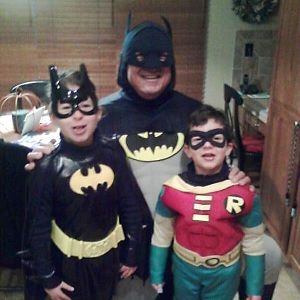

Courtesy of the Hurdle familyClint Hurdle enjoys Halloween with son Christian, right, and daughter Maddie, who was diagnosed with a rare disorder called Prader-Willi syndrome.
If that, along with the emails, seemed corny, all they had to do was see Hurdle with Maddie. At that point, they knew their manager was genuine. After every home game, she would be waiting for her father in the stadium family room -- crying if they lost, thumbs up if they won. She wanted to marry Neil Walker. Her other favorite player was Andrew McCutchen. In some ways, there was already the "We Are Family" feeling that the Willie Stargell Pirates had in the 1970s. Now all they had to do was win.
"He's done it from day one," Walker says. "He's reminded us where this ballclub has been, where this organization has been. He's reminded us where we can be and where we should be, and I think the biggest thing that he's pulled out of all of us is believing in ourselves.
"It also resonates in the clubhouse when you see him interact with Maddie. He always has a smile on his face. He comes into work every day with a good attitude, and that kind of rubs off on each and every one of us."
That first season in Pittsburgh, 2011, ended up being a tease of sorts. The Pirates were in first place on July 18 that year, the latest they'd been in front of the standings since 1997. But a bad call at home plate led to a 19-inning loss in Atlanta, and the team never recovered, finishing in fourth place with a 72-90 record.
"Very little of what I send is written by me. It's by authors I respect. ... When I send these, I'm not thinking, the players or so-and-so needs to read this. Most of the time the so-and-so who needs to read it is me."-- Clint Hurdle
The next season, 2012, was almost a mirror image. The Pirates were 13 games over .500 in August, only to collapse and finish 79-83. But, every day, after every loss, there was an email from Hurdle in their inboxes. Every one of them ending with the tag line, "Make a difference today. Love Clint."
"Very little of what I send is written by me," Hurdle says. "It's by authors I respect. The reason behind it is there are a number of times in my life where I've gotten in lonely spots, sometimes by choices of my own and some by situations I had no control over. And there'd be somebody or a group that would come my way and just grab me and say, 'You'll be OK, here's what you need to do.' Whether it's my dad or Karla or Keli. People like that. People have looked me in the eye and said, 'You matter, you can make a difference.' They spoke greatness to me at a time when I didn't feel very great.
"When I send these, I'm not thinking, the players or so-and-so needs to read this. Most of the time the so-and-so who needs to read it is me."
Somehow, the laughter has lasted all of 2013, or at least up until now. If ever Hurdle needed perspective after a rough loss, he would look up at his own PNC Park office wall, where he had framed the John Lennon quote on happiness. "Those great philosophers, the Beatles," Hurdle says. "But I think when everybody finally gets it, they'll realize life's really about being happy. Not about stuff, job titles. It's about being happy."
By now, his emails were being read on every continent. Pirates players forwarded his notes to their wives, who forwarded them to their girlfriends, who forwarded them to their moms, who forwarded them to their neighbors, who passed them along somewhere else. By this season, his email list hit 1,000.
[+] Enlarge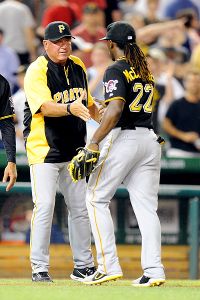

G Fiume/Getty ImagesClint Hurdle has gotten the most out of a young Pirates team that features MVP candidate Andrew McCutchen.
But by August it was finally about a pennant race. According to Pirates hitting coach Jay Bell, Hurdle's constant message to the Pirates this season was "to play every single pitch. Every pitch is a game within the game. Don't take a pitch off."
It was an ambitious goal, but, thanks to the MVP-caliber season of McCutchen, the arrival of pitching sensation Gerrit Cole, the home run power of Pedro Alvarez and the grit of new catcher Russell Martin, the Pirates haven't veered much off course.
"I feel like young teams like ours tend to dwell on losses [more] than teams that win," McCutchen says. "Teams that win, they lose a game and say, 'We'll get 'em tomorrow.' So, [Hurdle] has turned that table for us. If we do lose a game, we really just go in the showers, wash it off and get ready for the next day."
There was that exact kind of cruel loss on Sept. 20 to Cincinnati when the Pirates held a 5-2 lead with two outs and one man on in the ninth -- only to have shortstop Jordy Mercerthrow away the final out. The Pirates fell in 10 innings, 6-5, and, once again, the team needed a "Love Clint."
The next few days were full of nerve-wracking ballgames until, on Monday night, at Wrigley Field, Starling Marte loved Clint back and hit a home run to beat the Cubs -- which clinched a National League wild-card berth when the Nationals lost an hour later.
Champagne popped in the Pirates' clubhouse, although Hurdle -- once again in the right place at the right time -- sipped none of it. He drank apple cider. He is clean and sober going on 15 years now. He is a family man. He makes a difference.
From his relatively dry office at archaic Wrigley Field, he called home to talk, weep and celebrate with Karla and Maddie.
From his iPhone.




No comments:
Post a Comment